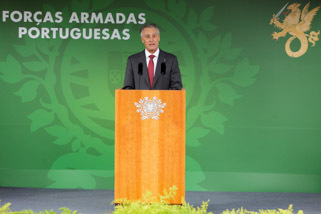

Mister Speaker
Excellency,
Having received for enactment Parliamentary Decree No. 349/X, which introduces the first alteration to Law No. 7/2001, dated 11 May, I have decided, in the terms of Article No. 136 of the Constitution, not to enact that bill, based upon the following premises:
1 – In Portuguese society, the option to live in concubinage has been growing in size, such as mirrored in statistical data showing an increase in the number of people that have chosen such an option.
This is the personal choice of leading a life in common that, in a free, open and plural society must deserve the respect of the State, by not placing any obstacles to its being chosen, nor imposing on people another model of life in common.
2 – The dimension achieved by this phenomenon, even in purely quantitative terms, has brought about multiple and diversified issues, be it on a personal level or in terms of property ownership.
However, the global definition of the juridical regime of concubinage requires that the legislator makes a choice between two clearly differentiated models: one is based upon a rise in the trend for a transition of the regime of concubinage to the juridical regime of marriage; one other, clearly distinguishes, whether as to its preliminary bases or as to its contents, the marriage regime from the concubinage regime, configuring concubinage as an option of freedom to which correspond simpler and more flexible juridical effects than those affecting marriages, without prejudice to the discrete extension of rights and duties imposed by the constitutional principle of equality. .
3 – This is a fundamental option imposed upon the legislator, between two clearly differentiated juridical models, which will correspond to equally distinct legislative solutions, with greatly diversified practical consequences within the citizens’ personal affairs.
A wide range for debate in this respect is thus opened within Portuguese society, which must be very carefully thought over and matured, since it concerns the respect for a free and voluntary decision of many thousands, who chose a life in common which they did not wish should be framed within the juridical regime of marriage.
4 – In effect, the assimilation of the juridical regime of concubinage to that of marriage may finally result in the shrinking of an area of freedom of choice. To which is added the risk that the trend towards the assimilation of two distinct realities – and that the people wish should remain distinct – is finally converted in the creation of several types of marriage, or more properly, transforming concubinage in a «para-marriage», a «proto-marriage» or a «second class marriage».
5 – Several questions arise in this respect. It is thus immediately possible to ask: must the juridical regime of concubinage evolve towards assimilation to that of marriage? Or, on the contrary, will a regime of concubinage subsist distinct from that of marriage, simpler and more flexible, that individuals may freely choose? If the legislator opts for a model of assimilation, should not the people be allowed, as a minimum, to continue living away from this now more rigid framework? Will it be possible to conceive a model which ensures a balanced but more consistent juridical protection to those who wish to live in concubinage without this resulting in an undesired equivalence to the marriage regime?
6 – The bill in question contains complex legal solutions which clearly show that the legislator opted for the approach of the regime of concubinage to that of marriage – establishing, for instance, in article No. 5-A, a presumption of common property of assets and a rule of mutual responsibility for debts or foreseeing the possibility of compensation for damages in case the concubinage is dissolved – without such an option having been preceded by the required debate within Portuguese society, involving specialists in various areas which are relevant to the matter under consideration and, of course, the people.
7 – The absence of deep debate over a matter which naturally generates controversy shows, in addition, the lack of opportunity to bring about such an important change when a parliamentary term is ending, at a time when the attention of politicians and people is concentrated on other priorities. More than this, in an area where multiple practical aspects of peoples’ lives are placed at issue, a principle of stability and predictability of Law is required, so that any solution which comes to be chosen should be deserving of adequate thought and deep discussion.
8 – As such, without denying the eventual need to perfect the juridical regime of concubinage – a prime responsibility for the new legislator – it is considered that in the current environment these changes are not only inopportune but were equally not subject to the discussion required by such a relevant subject, especially due to the consequences which will derive from them to the lives of many thousands of Portuguese.
As such, in the terms of article No. 136 of the Constitution, I have decided to return without enactment Parliamentary Decree No. 349/X, which introduces the first alteration to Law No. 7/2110, dated 11 May.
© 2006-2016 Presidency of the Portuguese Republic
You have gained access to the records of the Official Site of the Presidency of the Republic from 9 March 2006 to 9 March 2016.
The contents available here were entered in the site during the 10 year period covering the two mandates of President of the Republic Aníbal Cavaco Silva.